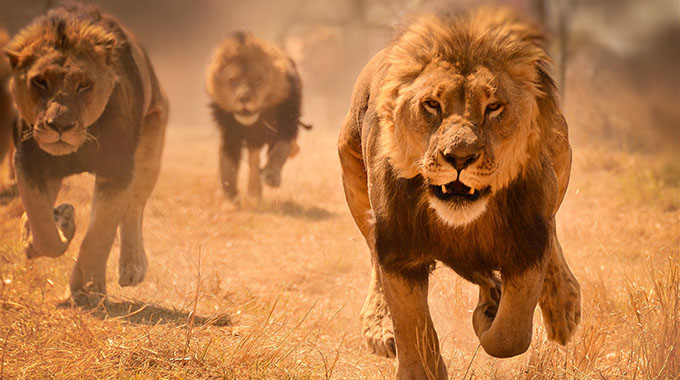
From George Maponga in Masvingo
Three carcasses of lions were recently recovered in the wildlife-rich Gonarezhou National Park, south-east of the Lowveld amid fears that poachers from Mozambique were using cyanide to poison animals.
The recovery of the carcasses preceded a raid by a joint team comprising members of the army, police and rangers from ZimParks, on a makeshift camp set up by suspected poachers in Gonarezhou, which led to the discovery of lion skulls and canine teeth, whose carcasses have not yet been accounted for.
The raid led to the arrest of five suspected poachers who will soon be arraigned before the courts.
The makeshift camp was destroyed and further tests are underway to establish the type of poison that was used by the suspects to bait the lions using donkey meat that was recovered during the operation.
Gonarezhou Conservation Trust (GCT) senior area manager Mr Evious Mpofu confirmed the recovery of three lion carcasses in the park.
Mr Mpofu said tests concluded that the lions ate donkey meat laced with cyanide.
“We recovered lion carcasses and according to tests that we made the cats died after eating a donkey carcass laced with cyanide. We collected samples for further testing and we are waiting for the results,” said Mr Mpofu.
“A joint team from various security agencies arrested six suspects after setting up a temporary camp inside the park, which was also destroyed and we suspect that poachers were planning to launch their illegal activities from there.”
Temik, which is widely used as a pesticide was recovered in the raid. It attacks the nervous system and causes breathing complications and there are suspicions that poachers intended to use it to poison lions.
Mr Mpofu said one of the suspects disclosed that body parts from the dead cats in Gonarezhou were being smuggled into Mozambique through Chiqualaquala Border Post.
“There is a thriving lion bones and body parts market in Mozambique, which is fuelled by illegal traders from South Africa and Mozambique,” said Mr Mpofu.
There were fears that use of cyanide and other dangerous substances by poachers could affect communities adjacent to the mega-park while also having a negative effect on the environment.
Cases of poachers had significantly declined in Gonarezhou following the birth of the Gonarezhou Conservation Trust, which among other things seeks to conserve wildlife and ensure sustainable wildlife management to stem humans/wildlife conflict.
Gonarezhou is part of the world-acclaimed Great Limpopo Transfrontier Park which also includes South Africa’s Kruger and Mozambique’s Limpopo National Parks to create arguably the world’s biggest wildlife habitat in terms of fauna and flora.
The porous and long border between Zimbabwe and its two south eastern neighbours SA and Mozambique makes it a favourite route for smugglers and cross-border poachers.
